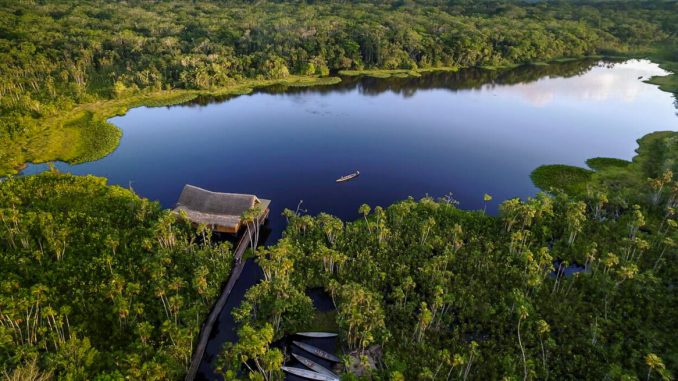
After a breathtaking ride over the snowy peaks of the Andes Mountains, the turboprop plane descended from thin air to the thick, humid atmosphere of the jungle. Below us, a muddy river coiled through vibrant verdant forest—until the thick tangle of trees gave way to the dull brown patchwork quilt of agriculture. Ahead lay the airport runway of the city of Coca, near where another river merged and created an even wider winding flow.
Beneath me was the Amazon basin, but still a long way from Brazil. It takes a lot of water to feed the world’s largest river by volume. Ecuador is home to a mere 2 percent of the big river’s source waters, but the three nights I spent at an eco-lodge along the Napo River would be unforgettable. But first I had another two hours of travel on a long and low river launch before I could check in.
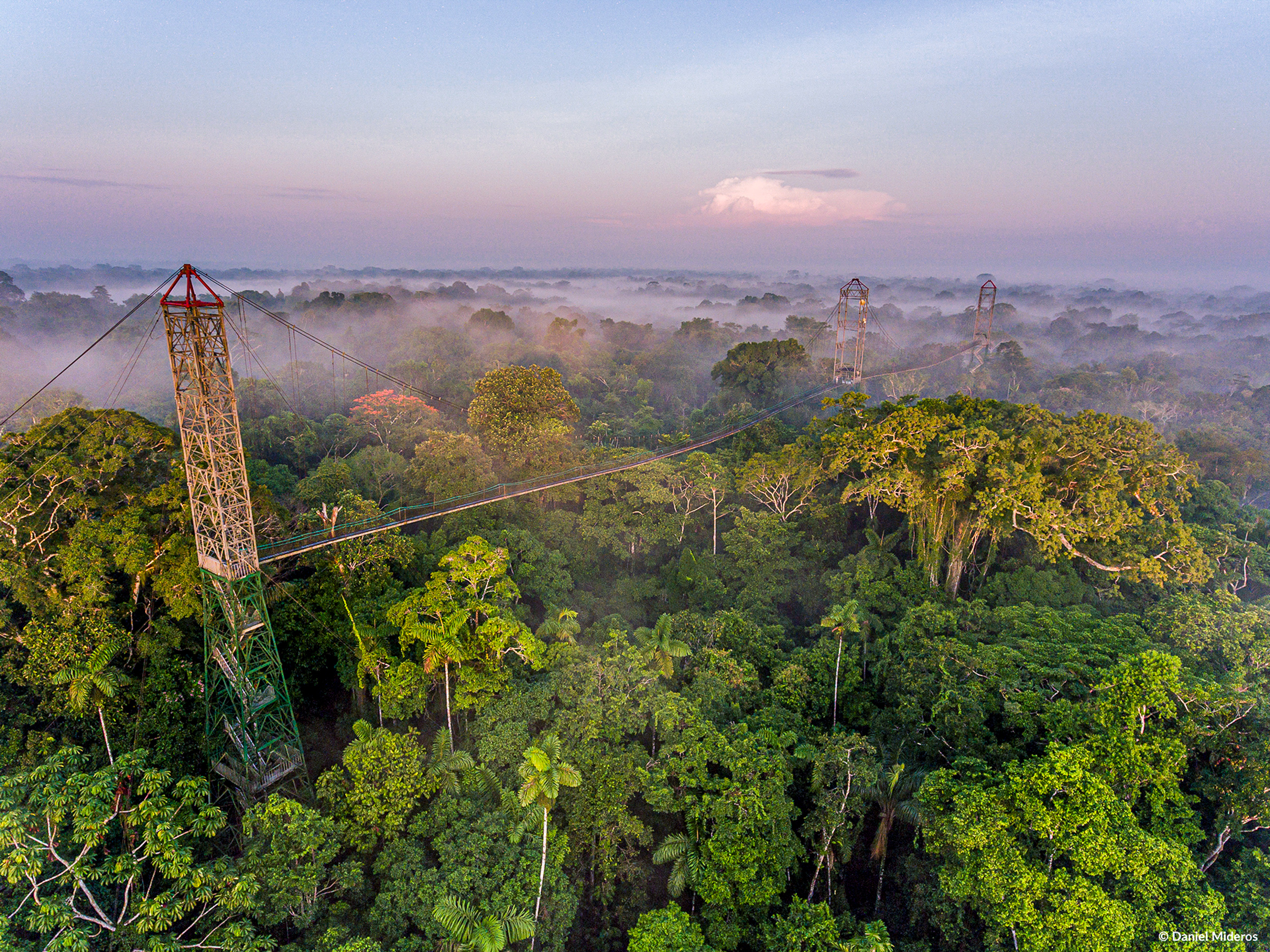
A Private Reserve
Sacha Lodge sits at the heart of a private 5,000-acre ecological reserve along the diminutive Pilchicocha Lagoon. Nestled into the surrounding rainforest, a short hike from the banks of the Napo River, the thatched-roof central building and family cabins are modestly woven into the landscape. All brought to you by Coca-Cola, you could say. Well, sort of. A Swiss citizen, Arnold “Benny” Ammeter used to work in distribution for the soda company and found himself deep in the remote markets of Ecuador. He became enamored of the beauty of this region and eventually returned to open an eco-lodge.
After a short time, he didn’t feel the resort was remote enough, so he searched for and found land even deeper into the wild, down the Napo River. With the assistance of local workers, he built Sacha Lodge, and over the years he purchased more acreage. Thanks to a commitment to hire locally, Sacha Lodge is the largest tourism-based employer in this entire region of Ecuador. The guides are primarily local as well, many of them able to draw upon not just typical naturalist knowledge but cultural learning, such as the medicinal uses of plants along the trails.
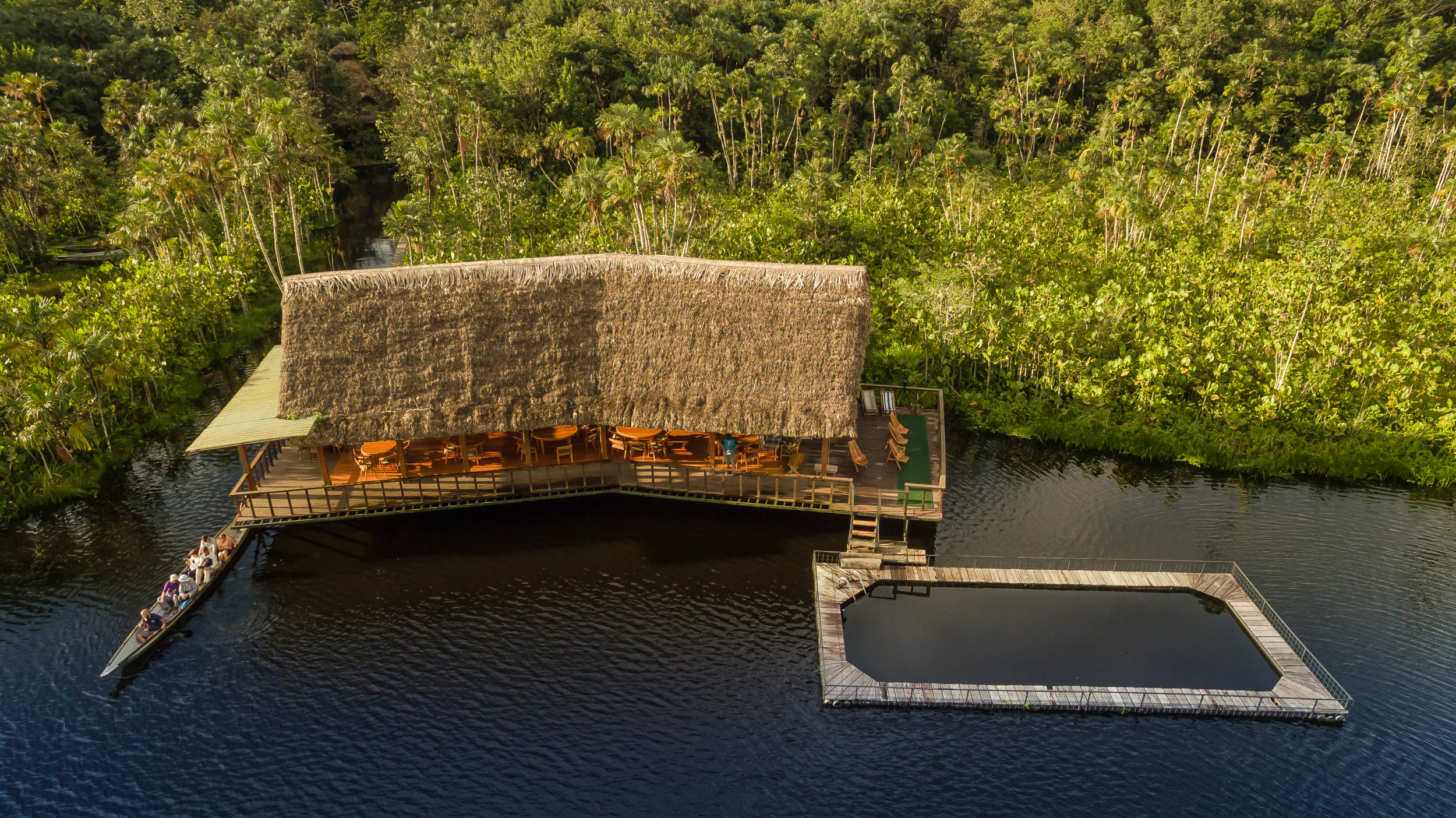
Into the Wild
“Wake up call is at 5:30,” we were told during the new arrival briefing.
“So early?”
“Because that’s when the animals get up.” We rest at midday, once again, just like the animals.
Boardwalks connect all the rooms and lodge buildings, which rise up on stilts above the mix of terra firma and marsh waters the color of sarsaparilla. Trails, muddy paths, or simple plank walks lead out into the forest. Umbrellas, ponchos, and, thankfully, knee-high rubber boots are provided by the lodge so guests don’t need to pack special gear.
They don’t call this a rainforest for nothing. Depending on the season, rain can affect the day’s activities. Downpours can be sudden and torrential, or the gray can come in almost as fine as a mist and last the entire day. But if you don’t mind getting a little damp—and you will—the hikes go on regardless. Under the forest canopy, the rain can be less intense.
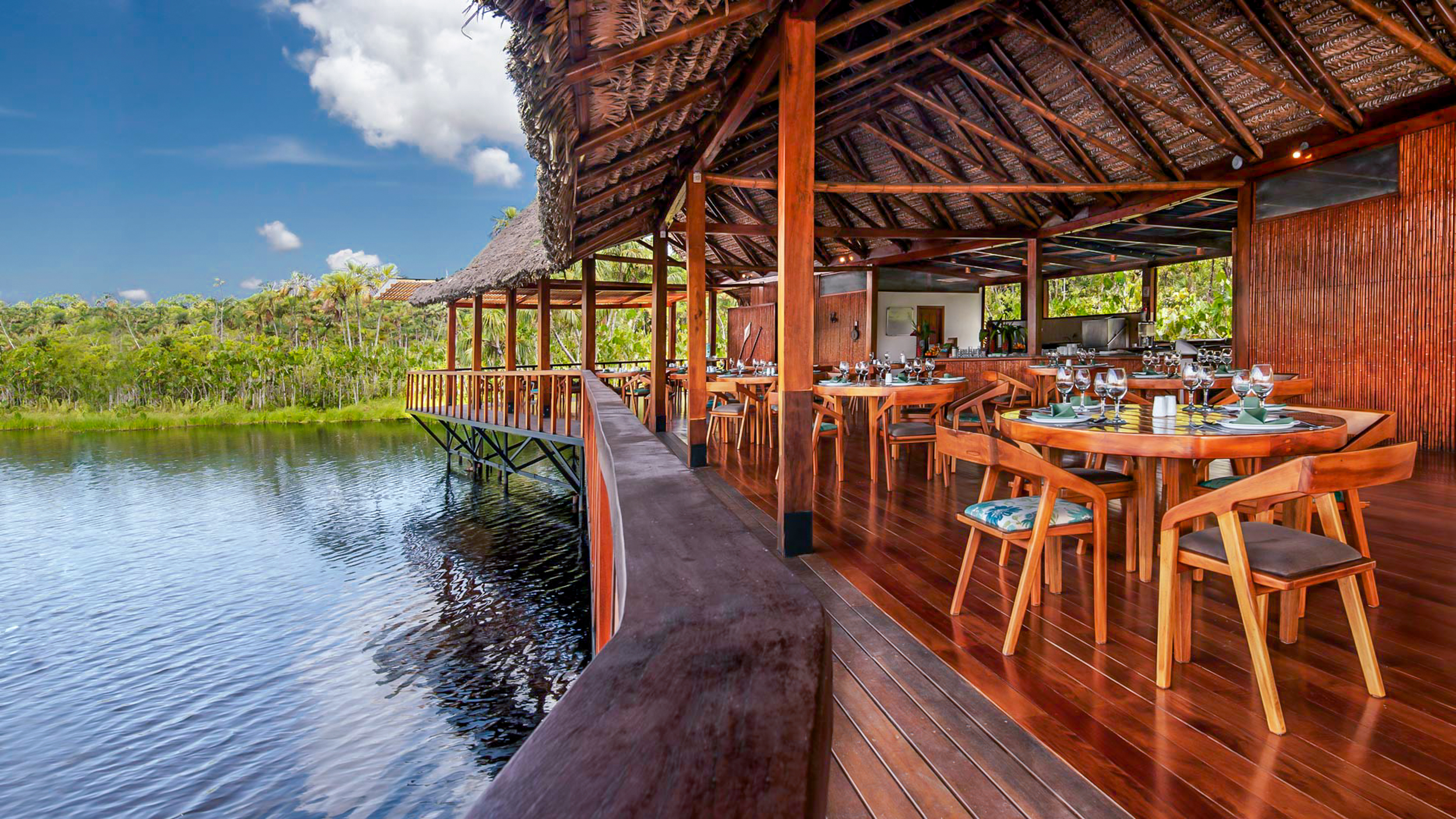
Otters swim in the lagoon. Eight species of monkeys make their homes in the trees, from the world’s tiniest, the pygmy marmoset, to the Pavarotti-aspiring howler monkeys, whose call is so deep and resonant it can be heard a mile away. The abundance of avian life draws birders from far and wide, and during a typical stay, one is likely to see more than 200 species. The lodge guides have recorded nearly 600.
We gathered again in the evening for a night hike. We all carried lodge flashlights, but the guide could spot animals deep in the bush off the trail even in the dark. They know where to look. A special frog on a certain tree; a snake that frequently appears near another.
Dinner at the fine-dining restaurant offers a scenic overlook of the lake. At night, the stars reflect in the water, clear enough to see the constellations—many of which may be unfamiliar to northerners. The Big Dipper and the Southern Cross face each other on opposite ends of the balance of the heavens.
During the day, some guests swam a bit or napped in hammocks. I watched a local man on the dock drop a line in the water and asked him what he was fishing for. “Piranhas,” he replied. What? Where we swim?
Caimans—small crocodiles about a meter long from snout to tail—also call the little black lake home, and on barbeque night when dinner was moved from the lodge dining room to the grill in the dockside pavilion, one apparently had made reservations, snapping up pieces of chicken and pork dropped over the rail by servers.
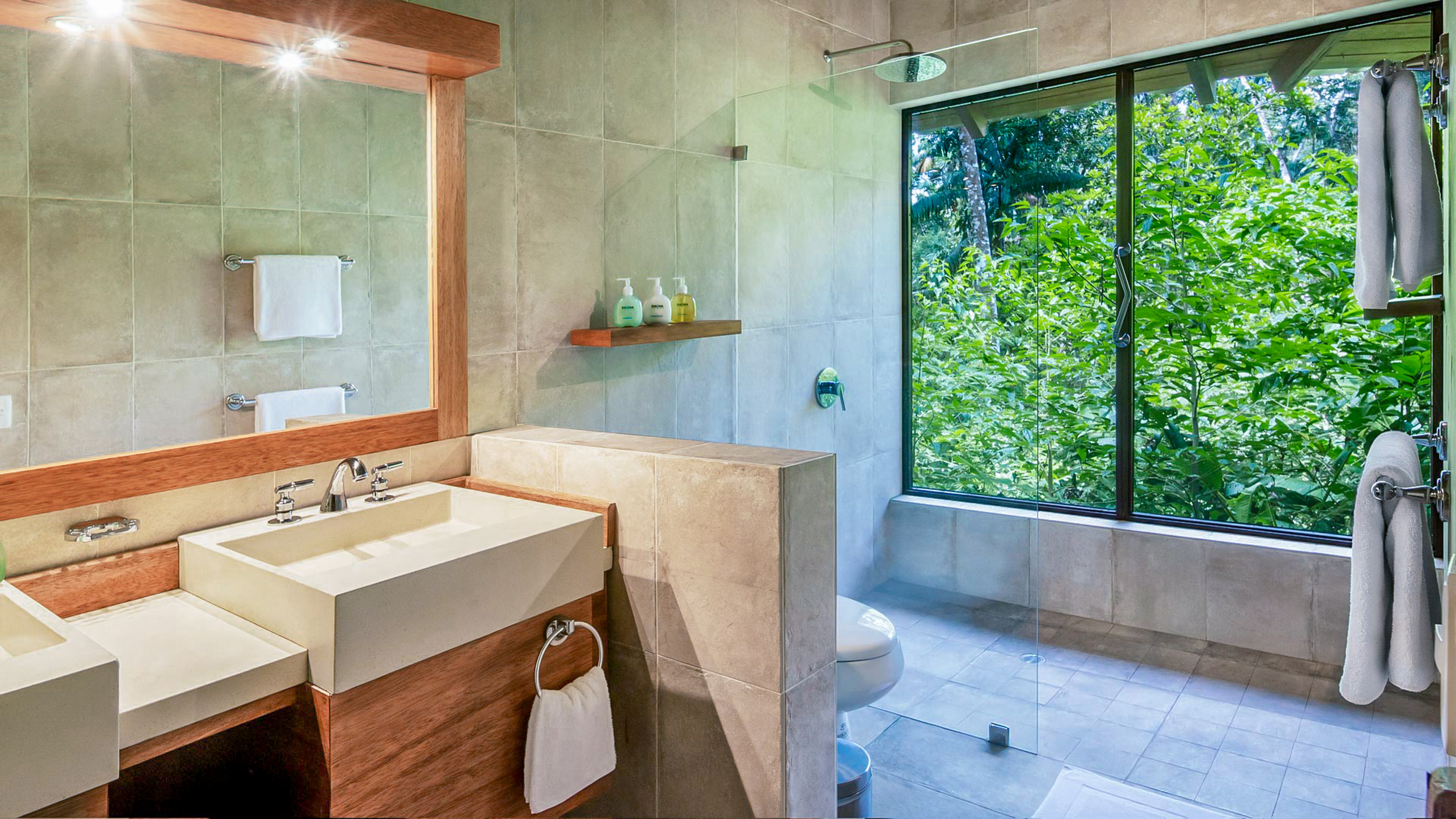
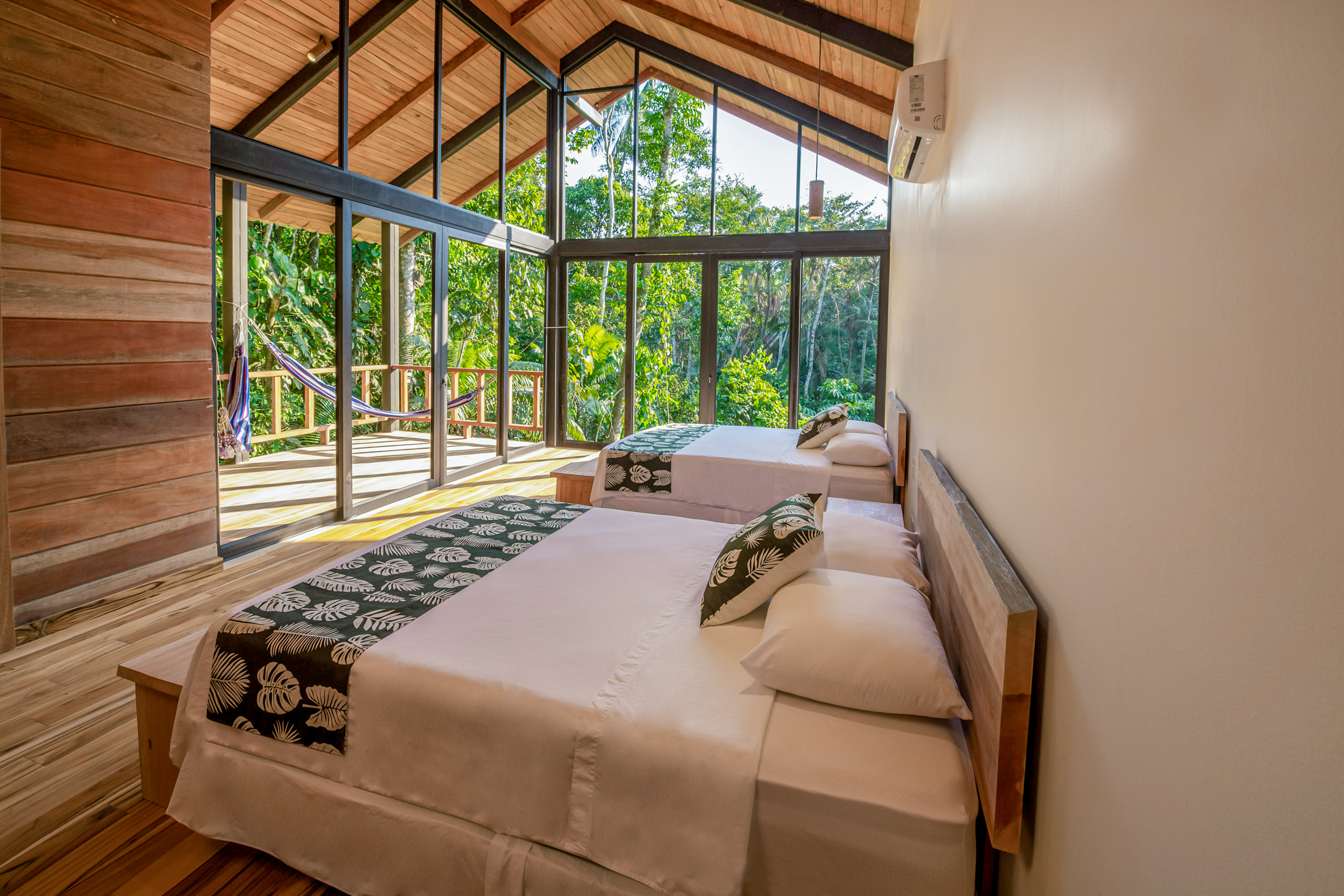
Beyond the Lodge
Back out on the Napo River, the launch took a group of us to other sweet spots: A butterfly farm featuring exotic local varieties in a shelter where you can step in and join them. Also along the river is a clay lick, a favored spot for parakeets and macaws. They come at unpredictable times, but they came that day. A flurry and blur of iridescent blue, green, and bits of scarlet as countless birds swooped in and clung to the mud cliff, eating the clay, which is believed to counterbalance the acidity in their other foods.
And then there are the sights above the lodge. A short hike away into the rainforest, there’s a series of towers. Steps lead to the top, where it breaks through the canopy, and a steel catwalk 150 feet in the air stretches out across the treetops, offering closer views of the avian residents. There’s really no need to make much effort to find more birds: Even just outside the rooms, there are oropendolas, crow-like brown birds with golden tails, building their pouch-shaped nests dangling from a large kapok tree in the center of the compound. Their call, not unlike the cool tinkle of water drops in a pool, adds an exotic twist to the white noise of insects and frogs, a soundtrack worthy of an Amazon experience.
Kevin Revolinski is an avid traveler, craft beer enthusiast, and home cooking fan. He is the author of 15 books, including “The Yogurt Man Cometh: Tales of an American Teacher in Turkey” and his new collection of short stories, “Stealing Away.” He is based in Madison, Wis., and his website is TheMadTraveler.com





Be the first to comment